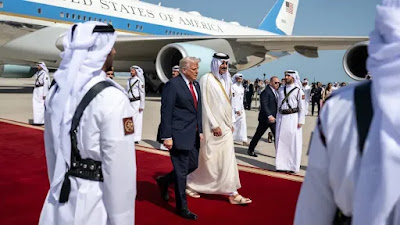US Moves Ahead, Rest of Globe Waits
Deepak Razdan
Friday, 16 May,
2025
Things are quite
normal in the New World, i.e. for its creator, the US, and its major ally, the
United Kingdom. The rest of the world is still wondering how soon it will come
out of the trade blockade imposed by US tariffs early last month.
The
Ukraine-Russia war continues in all its fury, despite Europe’s warning of
tougher sanctions against Russia and Russian President Vladimir Putin’s offer
of direct talks to end the war.
For the first time since the beginning of the war in 2022, Ukraine and Russia held official-level talks in Istanbul in Turkiye on Friday, and agreed on exchange of prisoners of war.
Simultaneously, European and
UK leaders met at Albanian Capital Tirana for the European Political Community Summit and to discuss the
Ukraine war.
The
leaders extended support to Ukraine President Volodymyr Zelenskyy and hailed
him as the man for peace.
The Ukrainian
President had arrived in Ankara in Turkiye on Thursday for direct talks with Mr
Putin, but he did not come. Mr Zelenskyy was left commenting the Russian
President was not serious about the talks.
On his first
foreign tour of his Second Presidency in which he signed a trillion dollar
deals with Saudi Arabia and Qatar, US President Donald Trump virtually asked
the world to be patient with his efforts to end the Ukraine-Russia war. Nothing
will happen until he and Mr Putin meet, he said.
For the European
Union, there has been little choice, and EU leaders believe Mr Trump could end
for them uncertainties caused by the trade tariffs and the Ukraine war.
The US devised a new
regime of punitive trade tariffs for the world as it maintained the US economy
was being exploited by its trading partners. The tariffs were too harsh, and so
the world trade virtually came to a halt.
Responding to hue
and cry from different parts of the world, Mr Trump announced a 90-day pause in
the tariffs. China, with 145 per cent US tariff against it, had remained
unresponsive, while announcing its countermeasures.
Mr Trump was
quick to realise the US-China trade stoppage could not go on indefinitely and therefore
he let US Treasury Secretary Scott Bessent reach a preliminary trade
arrangement with Chinese representatives in Geneva.
That brought normalcy
for the US and China and eased world markets. But what about the rest of the
world; nothing is heard about the EU and other countries. The US reached a
bilateral trade deal with the UK earlier.
When will other
major economies of the world reach similar deals with the US, is the issue. Only
after these deals, these countries may have revised bilateral deals among
themselves.
The Ukraine war
has brought UK closer to its European neighbours. The UK-led Coalition of the
Willing comprising major European nations met in Kyiv on 10th May and discussed
the war.
In a statement,
the Coalition asked Mr Putin to accept an unconditional 30-day ceasefire in the
war or face tougher sanctions. Mr Trump was kept informed of the developments
by the Coalition leaders by a phone call from the Ukrainian Capital.
The UK-EU alliance
leaders waited for a US reaction but nothing was heard. In his address to US
soldiers at a US base in Qatar, Mr Trump talked of the Second World War and
said it was America which had won the war.
Neither the UK nor
EU leaders could dispute such a statement; America’s special contribution in
the defeat of Nazi Germany and end of the six-year war was a historic fact and always
acknowledged.
For Europe today,
the end of the Ukraine war was equally important. Not only the war was taking a
heavy toll of casualties, but raising several worries for the EU and the UK. How
would they raise a multi-nation security force to help Ukraine, was one of them.
The Russian
President has warned them against supplying arms or deploying their security
forces to support Ukraine.
After Kyiv, the
European leaders are meeting in Albania for the sixth Meeting of the
European Political Community. The theme of the meeting is important: “New
Europe in a new world: unity-cooperation-joint action.”
The meeting is being
attended by 47 heads of State and government, including UK’s Prime Minister
Keir Starmer, and 27 members of the European Union (EU). The conference will
have three high-level roundtables, including one on “Russia’s war against
Ukraine.”

Comments
Post a Comment